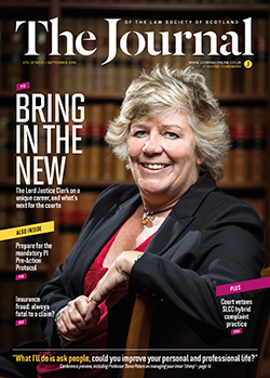Back to basics

Relevancy restated
I can do no better than quote a number of paragraphs from J G Reid QC’s opinion in Watson v Greater Glasgow Health Board [2016] CSOH 93 (5 July 2016):
“In general, a pursuer must set out the material facts and the basis in law which justify the claim being made, thus giving the defender fair notice of the case being made against him. What constitutes the material facts and the basis in law will vary from case to case. Not much will be required in a debt action. In a commercial contract case, particularly where much of the evidence is documentary, it may be necessary to set out some specific terms of the contract, how they were breached and what the consequences were in some detail.
“To have an action dismissed as irrelevant (whether for want of specification or otherwise), a defender must satisfy the court that even if the pursuer proves all his averments, his action must necessarily fail. As a corollary of that, a pursuer need only satisfy the court that he may succeed if he proves all his averments. He need not show that he is bound to succeed if he proves all his averments.
“In actions for damages for personal injuries, it has long been recognised that, as a matter of pleading, only the bare bones of the case need be pled although this is sometimes forgotten both by those drafting and criticising pleadings. Rules of court have provided for abbreviated forms of pleading. Surprisingly, however, there has grown up a practice of increasing the length of pleadings in some types of case by including an elaborate mixture of facts, evidence and argument, a practice which should be discouraged as it may often obscure rather than clarify what lies at the heart of a claim and how it may be established or refuted.”
“Ordain” is not an invitation
This should not really have to be set out here, but in light of the observations made by Lord Boyd in Warner v Scapa Flow Charters [2016] CSOH 101 (14 July 2016) it bears to be repeated. If a party is ordained by the court to do something, the instruction is mandatory, not advisory!
Has settlement been achieved?
If there is such a dispute, the normal procedure is a minute and answers. However in DWS v RMS [2016] SC GRE 47; 2016 GWD 22-402, Sheriff Mercer considered that it was competent to determine such a matter in the course of the main action.
Remit to Court of Session: personal injury
In AB v NHS Ayrshire & Arran [2016] CSOH 120 (12 August 2016), Lord Boyd required to determine whether personal injury actions raised in the sheriff court after the introduction of the Courts Reform (Scotland) Act 2014 should be remitted to the Court of Session. The procedure first requires the sheriff to determine whether the importance or difficulty of proceedings makes it appropriate to request the Court of Session to accept the remit. Lord Boyd accepted the remit. The parties supported the remit. There were over 300 cases involving the same ground of action alive in the Court of Session. A direction had been issued by the Lord President as to procedure for such actions. They were of significant public interest.
Civil jury trials
In Bridges v Alpha Insurance [2016] CSOH 114; 2016 GWD 23-419 Lord Tyre determined that if an exception was to be taken to directions given to a jury, in terms of the rules applicable both in the Court of Session and sheriff court, intimation was required immediately on conclusion of the charge. There was no scope for any latitude. The jury had commenced their deliberations and any interruption might result in their placing undue weight on the supplementary directions. In any event, any guidance given in the charge as to quantum was not a direction in law.
Whilst on the issue of jury trials, a passing comment on the Inner House decision in Sheridan v News Group Newspapers Ltd [2016] CSIH 67 (19 August 2016) is perhaps worthwhile. I doubt if anyone requires the background to be set out here. It is, however, interesting to note how difficult it is to attack the decision of a jury. The jury is to determine questions of fact. “Contrary to the evidence” means contrary to the evidence actually before the jury. The fact that a party lied on certain aspects of evidence did not mean that the decision of the jury was fatally undermined. The jury itself might have rejected the passages of evidence from the pursuer which were subsequently found to have been perjured. For a party to succeed in obtaining a new trial by reference to s 29 of the Court of Session Act 1988 the court must be satisfied that it is essential to the justice of the cause that the verdict be set aside.
Appeals
In Hamilton v Glasgow Community and Safety Services; Commercial First Business Ltd v Sweeney [2016] SAC (Civ) 3; 2016 GWD 21-363 the Sheriff Appeal Court considered the exercise of the dispensing power regarding a late application for permission to appeal. The court agreed that the dispensing power in rule 2.1 applied, because the time limit for such an application was set out in the rules. This power, however, would not normally be able to be prayed in aid of a late appeal when the time limit was laid down by statute.
In Aviva Insurance Ltd v Mann [2016] CSIH 63; 2016 GWD 23-420 the defender sought to challenge the granting of summary decree against him by appealing a subsequent interlocutor pronouncing decree of absolvitor in his favour, on the basis that the appeal against that subsequent interlocutor opened up the earlier interlocutor to challenge. Lady Paton, in the Inner House, refused the application. Where a party had been successful, it was only in very special or exceptional circumstances, and where there was sufficient causal connection between the complaint being made and the decision being appealed, that the person appealing would be permitted to reclaim against their own success. There was insufficient connection between the grounds of appeal and the decision, and the grounds disclosed no legal or procedural error.
Appeal remit to Court of Session
In Donnelly v The Royal Bank of Scotland plc [2016] SAC (Civ) 4; 2016 GWD 21-367 the Sheriff Appeal Court refused to remit an appeal to the Court of Session notwithstanding that the motion was not opposed. Such a power can be exercised in terms of s 112 of the Courts Reform (Scotland) Act 2014. The court observed that the provision permitted a remit. One was not necessitated even though an appeal raised a complex or novel point of law. If requested to remit, the court had to consider the nature of the appeal carefully. The court considered that when the various issues were broken down, they were not particularly complex either individually or taken together. The fact that the decision might be of importance to banks and claims companies was insufficient. It did not amount to national or wide ranging concern. There was no suggestion that the dispute was ultimately destined for the Supreme Court. This may indicate that any motion to remit to the Court of Session will not readily meet with success.
Family actions
Applications for an award in terms of s 29 of the Family Law (Scotland) Act 2006 require to be instituted within six months of the date of death. In X v A, 12 November 2015 ([2016] SC EDIN 54) and 1 February 2016 ([2016] SC EDIN 55), Sheriff Holligan in Edinburgh had to consider issues which arose from a claimant being unaware of the identity of the executors of the deceased within that period. The executor is in terms of the Ordinary Cause Rules required to be called as a defender. However, the appointment of an executor is not a prerequisite to raising such an action. A claim in terms of s 29 could be commenced other than by a claim against an executor. Thus an action cognitionis causa tantum raised against the close relatives of the deceased founded a claim in terms of the statute. It was competent for the pursuer subsequently to amend the action for constitution of the claim raised against the deceased’s estate to a claim against the executors in terms of s 29.
Expenses
In AP v Duncan [2016] CSOH 111 (26 July 2016) Lord Glennie considered a note of objections taken against an auditor’s report. As always, the points are very case specific, but one matter may be of general information. His Lordship determined that the certification of a skilled witness does not result in the expert’s charges being recovered regardless of when the work was done and regardless of other awards of expenses. As a result, awards of expenses made against a party prohibited an expert’s charges incurred over the periods covered by the awards being recovered.
Further, his Lordship noted that a point aired before him had not been raised in the note of objections. As a result, the point was not entertained as the auditor had not had the opportunity to comment on it. In Hill v Stewart Milne Group Ltd [2016] CSIH 65; 2016 GWD 24-443 the Inner House decided that it could award an additional fee covering not only proceedings before the division but also those at first instance in the sheriff court, albeit there might be circumstances in which it was appropriate to remit the matter to the sheriff to consider. The power was not restricted to the decision to award an additional fee in principle; the court required to specify the appropriate percentage.
An older decision came across my desk recently. In Blue v W H Malcolm Ltd, Hamilton Sheriff Court, 7 November 2014 the issue was whether the expenses in an ordinary action which had been resolved for a sum at the summary cause scale should be assessed or taxed. Sheriff Small determined that the value of the sum decerned was something of a red herring. Expenses in actions under the ordinary procedure were taxed. Those in actions under summary cause procedure could be assessed or taxed. The significance of the decision is that if expenses are taxed, an audit fee is incurred, which is not the case when expenses are assessed.
Update
Since the last article, Auchnie (or Willox) v Auchnie (July article) has been reported at 2016 SLT 740, Gibson v Menzies Aviation (UK) Ltd (March) at 2016 SLT (Sh Ct) 179, J’s Parent and Guardian v M & D (Leisure) Ltd (May) at 2016 SLT (Sh Ct) 185, and Dow v M & D Crolla Ltd (May) at 2016 SLT (Sh Ct) 191.
In this issue
- Beyond the named person service
- Sexual harassment: an everyday problem
- Governing Scotland in a federal United Kingdom
- Losing our judgment? (1)
- Reading for pleasure
- Opinion: Alison Reid
- Book reviews
- Profile
- President's column
- The future, step by step
- People on the move
- Changing face of the courts
- Success: the chimp factor
- Courts reform: a call to pre-action
- Teeth that could be sharper
- Good claims, bad lies
- Unlocking doors: demystifying squatting
- Back to basics
- Brexit and IP: what should solicitors be doing now?
- Agency, insolvency and termination
- Brexit and the agricultural sector
- A carnival for some, but not for others
- Scottish Solicitors' Discipline Tribunal
- Culling of the hybrids
- Common property: what policy?
- Cause of action
- Client balances: reminder issued
- Law reform roundup
- From the Brussels office
- Paralegal pointers
- Your Law Society of Scotland Council Members
- At the doors of the court
- Ask Ash
- To the focused, the medals
- Losing our judgment?
- MacKenzie boosts Society's AML drive






